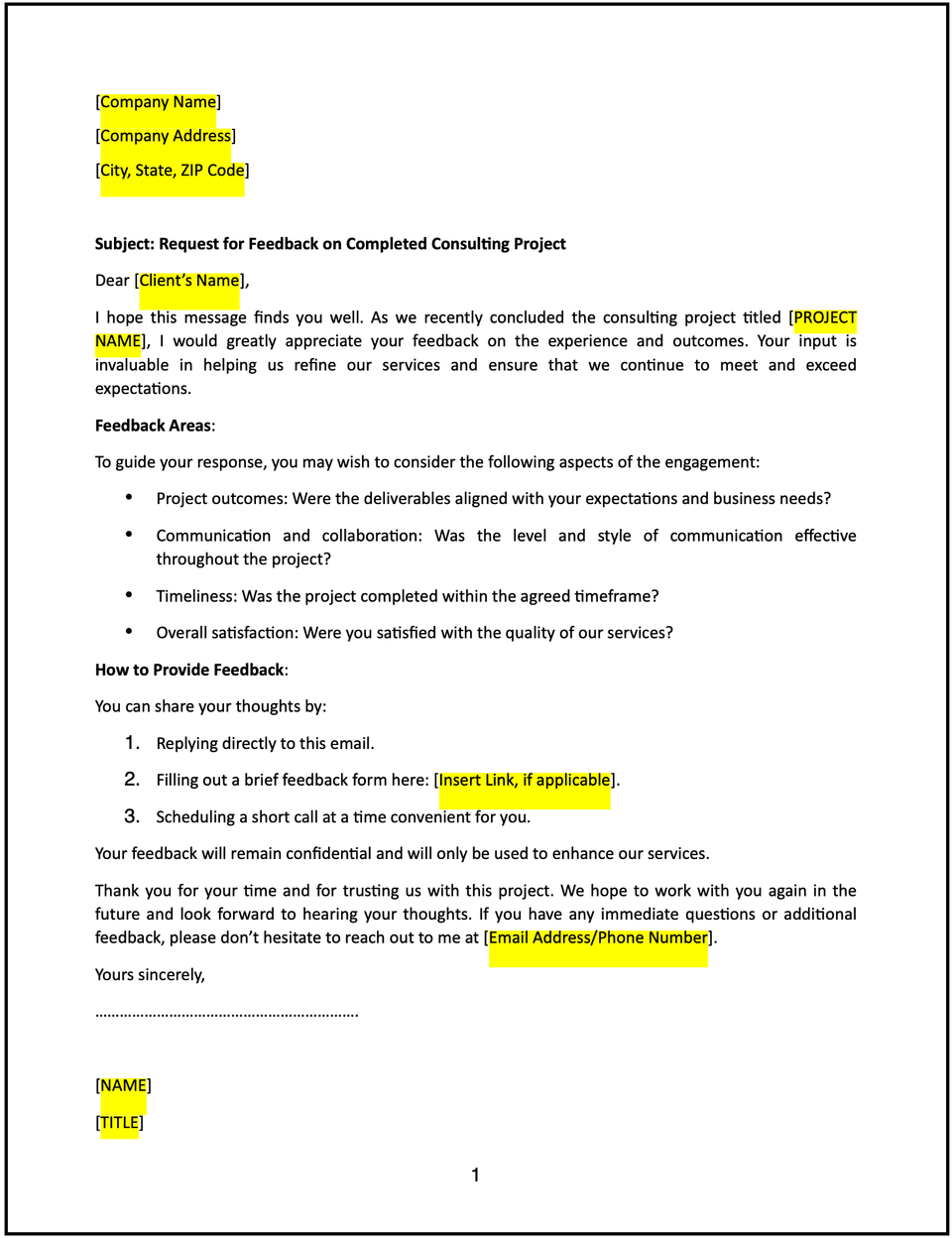Letter of request for feedback on completed consulting project: Free template

Letter of request for feedback on completed consulting project
A letter of request for feedback on a completed consulting project is a formal communication used to gather insights from stakeholders about their experience and satisfaction with the project. This feedback helps improve future projects, strengthens client relationships, and ensures alignment with expectations.
How to use this letter of request for feedback on completed consulting project
- Open with an introduction: Address the recipient respectfully and reference the recently completed consulting project by name or identification number.
- State the purpose: Clearly communicate your intent to gather feedback on the project’s deliverables, process, and overall experience.
- Provide context: Briefly explain why the feedback is important, such as enhancing service quality or refining processes for future engagements.
- Specify the areas of feedback: Mention key topics you’d like feedback on, such as project outcomes, communication, responsiveness, or value delivered.
- Offer a feedback format: Indicate how you’d prefer to receive feedback, such as through a survey, written comments, or a discussion.
- Reassure confidentiality: If applicable, reassure the recipient that their feedback will be kept confidential or used constructively.
- Encourage collaboration: Express appreciation for their time and input and highlight how their feedback contributes to improvements.
- Maintain a professional tone: Ensure the letter is clear, respectful, and focused on fostering a positive relationship.
- Provide contact information: Include details for the recipient to share their feedback or schedule a discussion.
Benefits of using a letter of request for feedback on completed consulting project
This letter ensures a structured and professional way to gather insights while fostering trust and collaboration. Here’s how it helps:
- Promotes improvement: Constructive feedback helps refine processes and deliverables for future projects.
- Reflects professionalism: A well-crafted letter demonstrates respect and commitment to excellence.
- Builds trust: Inviting feedback fosters transparency and strengthens client relationships.
- Supports client engagement: Seeking input shows clients that their opinions are valued and prioritized.
- Encourages accountability: Reviewing feedback ensures alignment with client expectations and standards.
Tips for writing an effective letter of request for feedback on completed consulting project
- Be specific: Clearly reference the project and outline the areas where feedback is most needed.
- Use professional language: Maintain a respectful and constructive tone to build trust.
- Provide context: Briefly explain why the feedback is important and how it will be used.
- Highlight mutual benefits: Emphasize how the feedback contributes to continuous improvement and better outcomes for future projects.
- Include actionable steps: Share instructions for submitting feedback, such as completing a survey or scheduling a meeting.
- Keep it concise: Focus on the essential points while ensuring the tone is professional and engaging.
Frequently asked questions (FAQs)
Q: What details should I include in this letter?
A: Include a reference to the project, specific areas for feedback, and instructions for sharing the feedback.
Q: Should I personalize the letter?
A: Yes, addressing the recipient by name and referencing their role in the project demonstrates attentiveness and professionalism.
Q: Who typically sends this letter?
A: Consulting firms, project managers, or client relationship managers typically send this letter.
Q: How formal should this letter be?
A: The tone should be professional, respectful, and collaborative to encourage honest and constructive feedback.
Q: When should this letter be sent?
A: Send the letter promptly after the project’s completion to ensure feedback is fresh and relevant.
Q: Can this letter include specific feedback questions?
A: Yes, including targeted questions or a feedback form can help guide the recipient’s input.
Q: Is acknowledgment from the recipient required?
A: While not mandatory, requesting acknowledgment ensures the recipient has received and understood the request.
This article contains general legal information and does not contain legal advice. Cobrief is not a law firm or a substitute for an attorney or law firm. The law is complex and changes often. For legal advice, please ask a lawyer.


